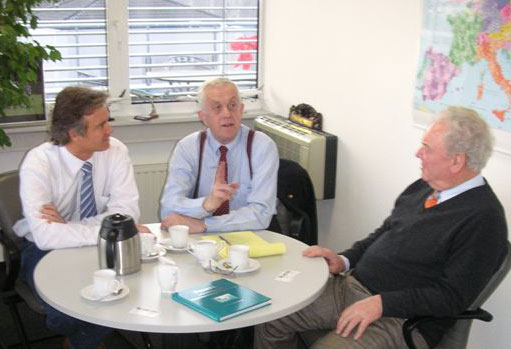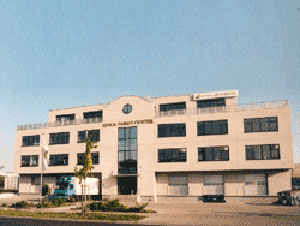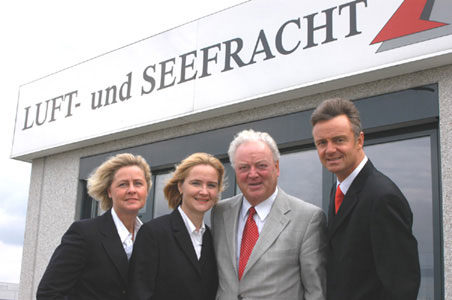Building
Forwarder Alliances
 Dieter
and Stephan Haltmayer in a conversation with FlyingTypers Publisher
Geoffrey Arend at QCS Haus. Dieter
and Stephan Haltmayer in a conversation with FlyingTypers Publisher
Geoffrey Arend at QCS Haus. |
 In
1974 Dieter Haltmayer founded Quick Cargo Service in Frankfurt am Main. In
1974 Dieter Haltmayer founded Quick Cargo Service in Frankfurt am Main.
His idea was to offer a door-to-door airfreight
service, an innovation at the time.
Today in addition to being one of the most
striking cargo facilities at FRA Cargo City South, there are Haltmayers
all over the place at QCS with Mr. Haltmayer's son Stephan, and daughters
Heidi and Jennifer building the company as well.
Today Quick Cargo Service is a family affair
and one of the five leading, privately owned IATA licensed forwarders in
Germany.
With seven branch offices at Germany's most
important trade and industry centers, and a professionally trained motivated
staff, Quick Cargo Service is well positioned as a leading forwarder and
logistics provider.
But Dieter Haltmayer is also a visionary.
Dieter Haltmayer, was the main founder of
IGLU Air Cargo GmbH, and he is currently the chairman of the company's advisory
board.
IGLU Air Cargo GmbH is a union of 21 medium-sized
airfreight forwarding companies in Germany formed to strengthen collective
buying and trading power.
Here excerpted from an absolutely excellent
presentation given last month in Dubai, Mr. Haltmayer discusses the formation,
future and importance of forwarder alliances in the 21st century.
His view is refreshingly void of self-promotion
and can serve the thousands of small businesses who read FT as a primer
of how to compete with the big boys in 21st century air cargo.

A Family Affair. Pictured together as always,
but this day celebrating 30 years of Quick Cargo Services are (left to right)
the Haltmayer daughters Heidi and Jennifer, the founder of QCS, Dieter Haltmayer
and son Stephan.
“In 1999 Lufthansa’s airfreight
management team explained to the airfreight industry that it was their
goal to work with 12 Global Players and to forget the rest of the forwarders.
We medium-sized forwarders had
to consider how we could succeed outside the ranks of these top 12 agents.
Lufthansa’s declaration was
the beginning of IATA airfreight agents pooling their export freight.
Groups of IATA forwarders came
together to consolidate their freight in order to stay competitive with
the global players.
Today there are three large groups
of this kind: Future, Challenge and Iglu Air Cargo GmbH. The combined
German market share of these three groups is 20.3%.
Suddenly the national carrier is
once again taking interest in these groups.
To be successful a midsize company
needs a global strategy.
Alliances and partnerships are
the core-strategy in building success today and in the future. Alliances
afford the small to medium forwarder the power to quote import rates from
all parts of the world using carriers of our choice.
Additionally the alliance generates
routing orders for traffic to increase export flow.
Each member of the alliance remains
financially independent.
In terms of jointly developed business,
profits are shared.
The Association of Common Interests
in Airfreight, original German name is the Interessengemeinschaft Luftfracht
or IGLU.
The IGLU alliance consists of 22
IATA airfreight agents in Germany.
IGLU Air Cargo GmbH is a worldwide
single enterprise that was founded by strong partners with the intention
of improving purchasing power and being successful outside the ranks of
the top 12 global players.
The objective of IGLU is to pool
freight at home at the two hubs of Frankfurt and Munich in order to remain
competitive in the market in the face of a growing concentration on preferred
partners on the part of some carriers, but also as a result of some competitors’
strategies.
Together the IGLU members have
a combined IATA turnover of $53.3 million USD and are ranked seventh amongst
top German consolidators.
IGLU has real buying power in the
market and all the other advantages that the big players have.
IGLU management decisions, from
budgeting to unified marketing strategy, are based on negotiation with
other medium-sized partners. This requires sensitivity.
The goals of IGLU are aligned to
maintain and increase the competitiveness of both the cooperation and
each individual partner in the long term.
A basic strategy of the cooperation
is to ensure a “win-win” situation for all involved.
Results are regularly checked and
evaluated and the partners are kept informed.
Once a month the five-person committee
meets to discuss any incidents of the previous four weeks with the IGLU
manager.
Through regular supervision processes
are checked for any errors, and suggestions for improvement are passed
on to the managing director as well as changes made where necessary.
IGLU began in January 2001 with
5.7 tons per month.
Freight from the numerous branch-offices
of the IGLU members is consolidated in Frankfurt and sent to a neutral
break-bulk agent at the destination.
Today IGLU loads 700 tons of freight
per month worldwide.
The trend, I am happy to report
is upwards as the monthly tonnage is growing.
Units are shipped to the Far East,
USA, Australia and more and more destinations are being added.
Today IGLU serves 80 destinations
worldwide.
The original aim of the cooperation
was to increase the competitiveness of its members.
It is now the case that through
their cooperation IGLU members are indeed competitive in the market.
They enjoy the same starting-point
as the global players.
Through pooling our forces IGLU
acquires strong buying power for securing rates, pallets and capacities.
IGLU has firm pallet bookings with
well-known airlines, which guarantees secured loading for the future too.
Because we mainly load complete
units rather than loose freight, security and supervision are substantially
improved.
Being able to load pallets leads
to a higher standard of service and security.
Furthermore, through the consolidation
of individual freight orders, a higher frequency of departures can be
offered.
Revenue can be increased on a sustained
basis through better rate-buying, through usage of ULD Rates, through
a greater use of consolidation and through improved customer
service.
The result of work as a cooperation
is profitable for all the partners involved.
IGLU members enjoy the advantages
of the big players, while remaining able to offer the kind of individual
customer service that only medium-sized companies can muster.
For Quick Cargo, the Chinese market
for us is of major focus right now.
However because China is difficult
to control from Germany we founded the CCA China Cargo Alliance.
The alliance consists of 50 to
60 Chinese forwarders with whom we have united under the slogan:
“We Bring the World to China
and China to the World ”.
The Chinese forwarders and QCS
worldwide partners meet annually in China in order to discuss air- and
sea freight development through bilateral discussions with each member.
Sales trips are organized within
China and to all parts of the world jointly with the CCA members.
Another alliance that we are part
of is The World Freight Alliance (WFA).
As a partner in the worldwide shipping
business, we have recruited highly qualified service providers all over
the globe, who look after our interests in each individual region of the
world.
WFA individual service providers
have very good local knowledge to offer at their homeports and airports.
Often the big players have no better
representation themselves.
WFA is represented across all five
continents through top business partners.
WFA members are able to compete
with the global players and their preferred carriers.”
|




 In
1974 Dieter Haltmayer founded Quick Cargo Service in Frankfurt am Main.
In
1974 Dieter Haltmayer founded Quick Cargo Service in Frankfurt am Main.